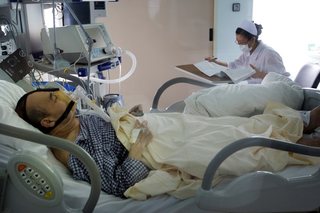VOTE SHORTAGE KILLS REFERENDUM.
Published:
21 November 1999 y., Sunday
Nearly 320,000 people cast votes on Nov. 13 against controversial changes to Latvia_s pension law in a referendum that does not count. Parliamentary opposition parties garnered support for the referendum in response to changes offered by the ruling coalition last August that would have bumped up the retirement age and frozen payments to working pensioners among other reforms aimed at trimming a growing budget deficit. Voters were asked whether the amendments should be vetoed. Most said "yes," but not enough. To be enforced, at least half the voters from the last parliamentary election had to show up at the polls Saturday - 482,334 voters - but only 339,614 turned out, or about 25 percent of registered voters. Preliminary totals show 319,881 voting in favor of tossing the stricter amendments while 18,289 voted to keep them. In poorer areas like the Latgale region in eastern Latvia, where many rely on pensions as their only form of income, a higher percentage of voters turned out than were needed. Polls in Daugavpils, the largest city in Latgale, drew 50 percent more than needed to fulfill the quorum. Latgale as a whole attracted 18 percent more voters than needed but was overshadowed by a low turnout elsewhere, including the capital city of Riga. In wealthier communities, like the port city of Ventspils, voter turnout was barely a quarter of the votes needed to make the referendum stick. The ruling coalition, which called the referendum a pointless political ploy, offered softer compromise amendments Nov. 4 that will take effect later this month. Despite those amendments, which easily passed Parliament more than a week before the Nov. 13 vote, opposition parties, led by the Social Democrats, continued to publicize the referendum with posters and direct mail fliers.
Copying, publishing, announcing any information from the News.lt portal without written permission of News.lt editorial office is prohibited.
The most popular articles
 51-year-old mother of eight, sits beside her sick husband, Tuy Muy, 52, in Battambang Provincial Referral Hospital. He is lying on a bed with a stomach problem, battling nausea and vomiting.
more »
51-year-old mother of eight, sits beside her sick husband, Tuy Muy, 52, in Battambang Provincial Referral Hospital. He is lying on a bed with a stomach problem, battling nausea and vomiting.
more »
 The length of maternity and paternity leave are at the heart of a crucial vote in the plenary sitting of March 24-25.
more »
The length of maternity and paternity leave are at the heart of a crucial vote in the plenary sitting of March 24-25.
more »
 The perception women have of the EU, the way the economic and financial crisis is affecting women and the lessons to be learnt ahead of the 2014 elections are among the issues to be tackled during a colloquium being held at the European Parliament on Tuesday.
more »
The perception women have of the EU, the way the economic and financial crisis is affecting women and the lessons to be learnt ahead of the 2014 elections are among the issues to be tackled during a colloquium being held at the European Parliament on Tuesday.
more »
 To achieve quicker de facto gender equality, Commission and Member States should adopt and implement specific gender equality policies, Parliament said in a resolution adopted on Thursday.
more »
To achieve quicker de facto gender equality, Commission and Member States should adopt and implement specific gender equality policies, Parliament said in a resolution adopted on Thursday.
more »
 Are you thinking about setting up your own business or are you already a successful entrepreneur? The Erasmus for Young Entrepreneurs exchange scheme offers an excellent opportunity for new entrepreneurs to acquire relevant skills for managing a small or medium-sized enterprise (SME).
more »
Are you thinking about setting up your own business or are you already a successful entrepreneur? The Erasmus for Young Entrepreneurs exchange scheme offers an excellent opportunity for new entrepreneurs to acquire relevant skills for managing a small or medium-sized enterprise (SME).
more »
 The pain of divorce and separation is all too often accompanied by financial and emotional hardship when one parent lives abroad and refuses to provide financial help.
more »
The pain of divorce and separation is all too often accompanied by financial and emotional hardship when one parent lives abroad and refuses to provide financial help.
more »
 Most Europeans still do not know they can call 112 anywhere in the EU to contact the police, fire brigade or an ambulance.
more »
Most Europeans still do not know they can call 112 anywhere in the EU to contact the police, fire brigade or an ambulance.
more »
 Helping to meet Haiti's humanitarian, reconstruction and nation-building needs must be the EU's priority in tackling the earthquake's aftermath, says Parliament in a resolution approved on Wednesday.
more »
Helping to meet Haiti's humanitarian, reconstruction and nation-building needs must be the EU's priority in tackling the earthquake's aftermath, says Parliament in a resolution approved on Wednesday.
more »
 Further work is needed to continue improving access to safe drinking-water at home, sewerage systems and safe bathing water throughout the European Region.
more »
Further work is needed to continue improving access to safe drinking-water at home, sewerage systems and safe bathing water throughout the European Region.
more »
 Poor housing remains a blight across Europe and Tuesday evening MEPs will debate a plan to extend EU funding to help renovate and repair housing stock for the poorest people on the continent.
more »
Poor housing remains a blight across Europe and Tuesday evening MEPs will debate a plan to extend EU funding to help renovate and repair housing stock for the poorest people on the continent.
more »